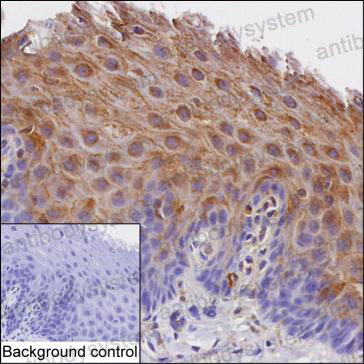Catalog No.
RHJ64203
Species reactivity
Human
Host species
Mouse
Isotype
IgG1
Clonality
Monoclonal
Tested applications
IHC: 1:100-1:200
Target
Lympho-epithelial Kazal-type-related inhibitor, SPINK5, LEKTI, Serine protease inhibitor Kazal-type 5
Concentration
1 mg/ml
Endotoxin level
Please contact with the lab for this information.
Purity
>95% as determined by SDS-PAGE.
Purification
Protein A/G purified from cell culture supernatant.
Accession
Q9NQ38
Applications
IHC
Form
Liquid
Storage buffer
0.01M PBS, pH 7.4, 0.05% Sodium Azide.
Stability and Storage
Use a manual defrost freezer and avoid repeated freeze-thaw cycles. Store at 4°C short term (1-2 weeks). Store at -20°C 12 months. Store at -80°C long term.
Clone ID
R3W84
Blocking of IL-4/IL-13 Signalling With Dupilumab Results in Restoration of Serum and Cutaneous Abnormalities in Netherton Syndrome., PMID:40344324
Polysaccharide, Conjugate, and mRNA-based Vaccines are Immunogenic in Patients with Netherton Syndrome., PMID:39476295
Rapid identification of primary atopic disorders (PAD) by a clinical landmark-guided, upfront use of genomic sequencing., PMID:39381601
Successful infliximab treatment in siblings with Netherton syndrome: Unveiling a novel SPINK5 gene variant and literature review., PMID:38419182
A novel immune-related model to predict prognosis and responsiveness to checkpoint and angiogenesis blockade therapy in advanced renal cancer., PMID:36998443
Prevalence of and risk factors for nutritional deficiency and food allergy in a cohort of 21 patients with Netherton syndrome., PMID:36705039
Biological treatments for pediatric Netherton syndrome., PMID:36619513
Dupilumab improves clinical symptoms in children with Netherton syndrome by suppressing Th2-mediated inflammation., PMID:36569942
Ustekinumab therapy for Netherton syndrome., PMID:36419401
Genome-wide association study identifies kallikrein 5 in type 2 inflammation-low asthma., PMID:35487308
Outcomes of Systemic Treatment in Children and Adults With Netherton Syndrome: A Systematic Review., PMID:35464459
Successful treatment of Netherton syndrome with dupilumab: A case report and review of the literature., PMID:34862657
Netherton Syndrome: Case Report and Review of the Literature., PMID:34604321
Genetic Analysis of a Cohort of 275 Patients with Hyper-IgE Syndromes and/or Chronic Mucocutaneous Candidiasis., PMID:34390440
A novel SPINK5 donor splice site variant in a child with Netherton syndrome., PMID:33534181
Netherton syndrome caused by compound heterozygous mutation, c.80A>G mutation in SPINK5 and large-sized genomic deletion mutation, and successful treatment of intravenous immunoglobulin., PMID:33452875
A novel SPINK5 mutation and successful subcutaneous immunoglobulin replacement therapy in a child with Netherton syndrome., PMID:32767583
Successful treatment with dupilumab of an adult with Netherton syndrome., PMID:32472705
Comel-Netherton syndrome: A local skin barrier defect in the absence of an underlying systemic immunodeficiency., PMID:31975472
Generation and Clinical Application of Gene-Modified Autologous Epidermal Sheets in Netherton Syndrome: Lessons Learned from a Phase 1 Trial., PMID:31288584
Hyper-IgE in the allergy clinic--when is it primary immunodeficiency?, PMID:30043993
[Pathogenesis of atopic dermatitis]., PMID:29404622
Desquamating Rash in a Patient with Undiagnosed Netherton Syndrome., PMID:29106927
The skin barrier function gene SPINK5 is associated with challenge-proven IgE-mediated food allergy in infants., PMID:28213955
Intrafamily and Interfamilial Phenotype Variation and Immature Immunity in Patients With Netherton Syndrome and Finnish SPINK5 Founder Mutation., PMID:26865388
A case of netherton syndrome: successful treatment with omalizumab and pulse prednisolone and its effects on cytokines and immunoglobulin levels., PMID:26592187
Heterogeneous and abnormal localization of desmosomal proteins in oral intraepithelial neoplasms., PMID:25231147
IgE allergen component-based profiling and atopic manifestations in patients with Netherton syndrome., PMID:25159469
Keratinocyte-specific mesotrypsin contributes to the desquamation process via kallikrein activation and LEKTI degradation., PMID:24390132
Factors that predict the clinical reactivity and tolerance in children with cow's milk allergy., PMID:23535094
Netherton syndrome in one Chinese adult with a novel mutation in the SPINK5 gene and immunohistochemical studies of LEKTI., PMID:22837558
[Expressions of receptor tyrosine kinases mRNA and protein in carcinoma of bladder]., PMID:21906447
Proteolytic activation cascade of the Netherton syndrome-defective protein, LEKTI, in the epidermis: implications for skin homeostasis., PMID:21697885
Hint for association of single nucleotide polymorphisms and haplotype in SPINK5 gene with atopic dermatitis in Koreans., PMID:21087323
A multi-centre study of candidate genes for wheeze and allergy: the International Study of Asthma and Allergies in Childhood Phase 2., PMID:20085599
Positionally cloned genes and age-specific effects in asthma and atopy: an international population-based cohort study (ECRHS)., PMID:19996348
Comèl-Netherton syndrome defined as primary immunodeficiency., PMID:19683336
Early skin biopsy is helpful for the diagnosis and management of neonatal and infantile erythrodermas., PMID:19615015
Analysis of SPINK 5, KLK 7 and FLG genotypes in a French atopic dermatitis cohort., PMID:17989887
LEKTI fragments specifically inhibit KLK5, KLK7, and KLK14 and control desquamation through a pH-dependent interaction., PMID:17596512
Netherton syndrome: report of identical twins presenting with severe atopic dermatitis., PMID:16670861
Netherton syndrome in two Japanese siblings with a novel mutation in the SPINK5 gene: immunohistochemical studies of LEKTI and other epidermal molecules., PMID:16225619
A Japanese infant with localized ichthyosis linearis circumflexa on the palms and soles harbouring a compound heterozygous mutation in the SPINK5 gene., PMID:16120162
LEKTI demonstrable by immunohistochemistry of the skin: a potential diagnostic skin test for Netherton syndrome., PMID:15606522
SPINK5 and Netherton syndrome: novel mutations, demonstration of missing LEKTI, and differential expression of transglutaminases., PMID:15304086
Association between polymorphisms in serine protease inhibitor, kazal type 5 and asthma phenotypes in a large German population sample., PMID:15005725
SPINK5: a gene for atopic dermatitis and asthma., PMID:15005722
LEKTI proteolytic processing in human primary keratinocytes, tissue distribution and defective expression in Netherton syndrome., PMID:12915442
Association of SPINK5 gene polymorphisms with atopic dermatitis in the Japanese population., PMID:12752122

